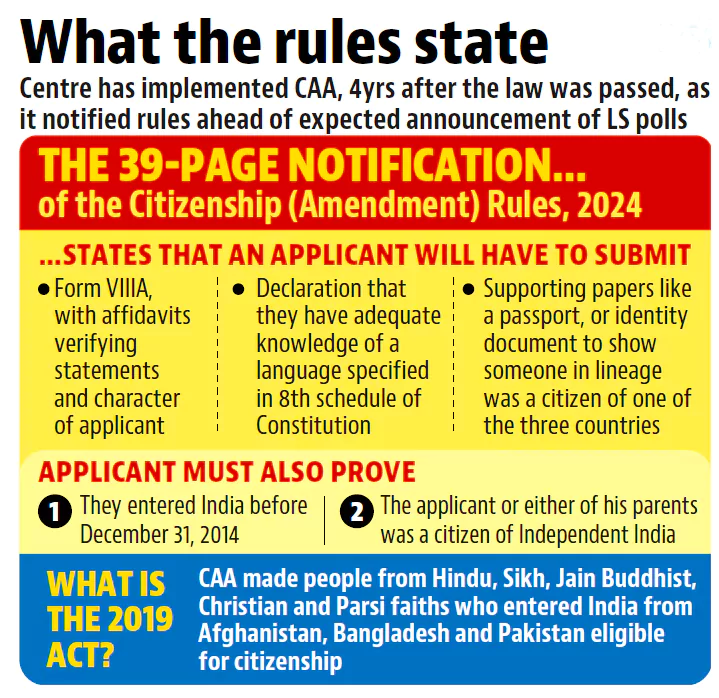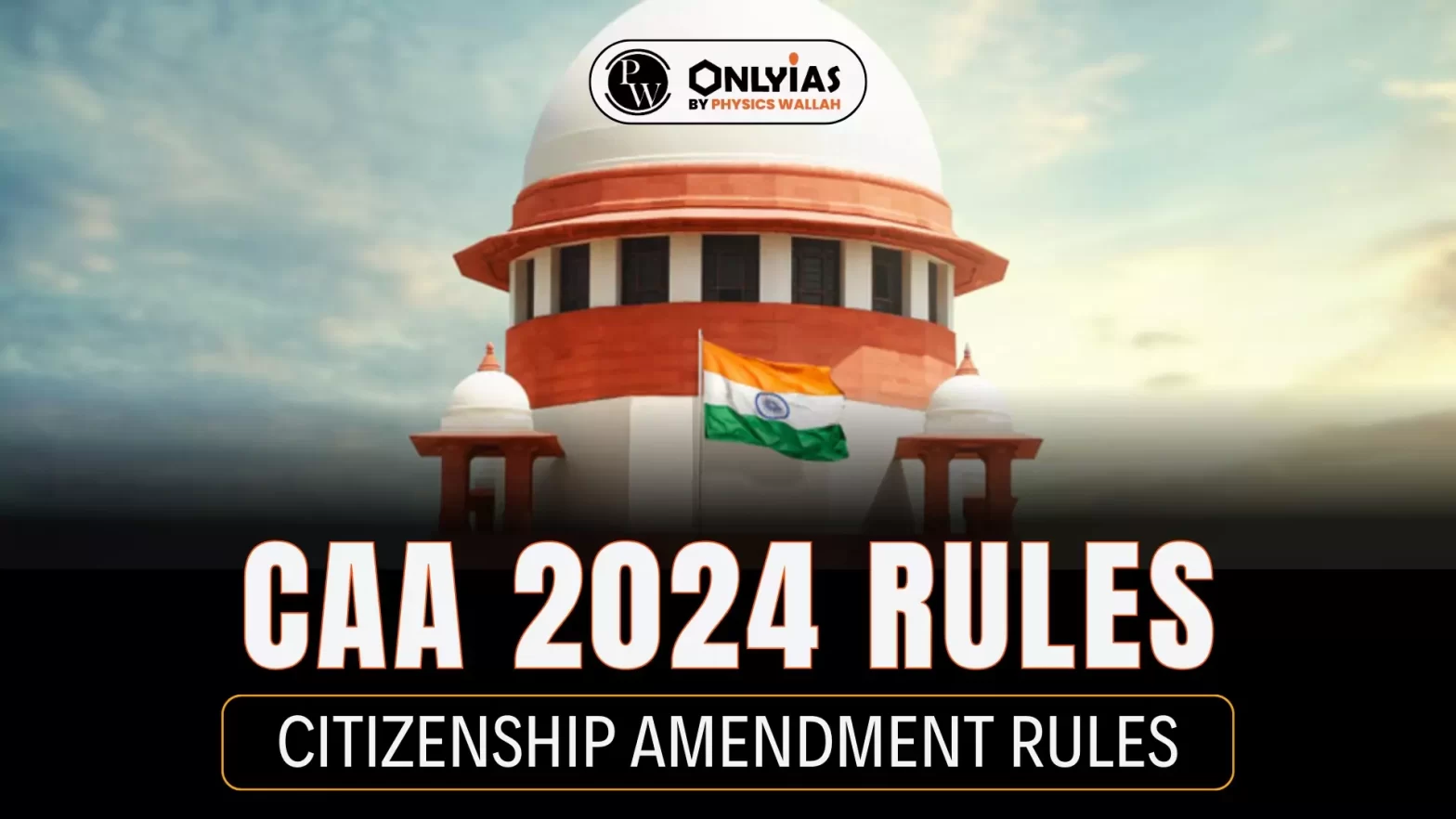Context
This Article is based on the news “Centre notifies CAA 2024 rules ahead of Lok Sabha polls schedule announcement” which was published in the Indian Express. The Ministry of Home Affairs Monday notified the Citizenship Amendment Rules 2024.
Enroll now for UPSC Online Course
CAA 2024 Rules: Citizenship Amendment Rules
- Implementation of Citizenship Amendment Act 2019: Citizenship Amendment Rules 2024 would enable the implementation of the Citizenship Amendment Act (CAA) passed by the Parliament in 2019.
- Portal for Application: The Ministry of Home Affairs has created a portal for this.
- The applicants must declare the year they entered India without travel documents.
- Delay in Implementation of CAA: Despite its enactment in 2019, the Citizenship Amendment Act (CAA) could not be implemented because the rules were not notified.
- Reasons for delay in Implementation: The delay in implementing the legislation has been attributed to widespread protests against it in states like Assam and Tripura.

Enroll now for UPSC Online Classes
What Are Citizenship Amendment Rules?
- About: The CAA 2024 rules now provide a framework for the application process for those eligible under Citizenship Amendment Act 2019.
- Application Process: The Citizenship Amendment Rules 2024, will enable persons eligible under the Citizenship (Amendment) Act (CAA), 2019 to submit their individual applications completely online to an Empowered Committee through a District Level Committee as may be notified by the Central Government.
- Eligible Applicants: They include individuals of Indian origin, spouses of Indian citizens, minor children of Indian citizens, individuals with registered Indian citizen parents, and Overseas Citizens of India Cardholders, among others.
- Permissible Documents: They include birth certificates, tenancy records, identity papers, and any licence, school or educational certificate issued by a government authority in Afghanistan, Pakistan and Bangladesh.
- The applicants will have to produce an “eligibility certificate” issued by a “locally reputed community institution” confirming that he/she belongs to the “Hindu/ Sikh/ Buddhist/ Jain/ Parsi/ Christian community and continues to be a member of the above-mentioned community.”
Enroll now for UPSC Online Coaching
What is Citizenship Amendment Act 2019?
- About: The Citizenship Amendment Act (CAA) is a legislative enactment that was passed on December 11, 2019 to amend the Citizenship Act of 1955.
- Citizenship to Religious Minorities: This amendment allowed for the grant of Indian citizenship to religious minorities, including Hindus, Sikhs, Buddhists, Jains, Parsis, and Christians, who fled from neighbouring Muslim-majority countries of Pakistan, Bangladesh, and Afghanistan due to religious persecution till December 31,2014.Reduced Number of Years of Indian Residency: Under the act, for the specified class of illegal migrants, the government has reduced the number of residency years to five.
- This marks a significant reduction from the previous requirement of 11 years for citizenship by naturalisation.
Who are ‘Citizens’?
- Citizens are full members of the Indian State and owe allegiance to it. They enjoy all civil and political rights.
Constitutional Provisions for Citizenship:
- The Constitution deals with citizenship from article 5 to 11 under Part II.
- Indian citizenship can be acquired by birth, descent, registration, naturalisation or by incorporation of territory.
Citizenship by Naturalisation:
- According to the Citizenship Act, of 1955, the Citizenship of India by naturalisation can be acquired by a foreigner (not being an illegal migrant) who is ordinarily resident in India for twelve years (throughout twelve months immediately preceding the date of application and for eleven years in the aggregate in the fourteen years).
- The CAA 2019 reduced this requirement of 11 years to five years.
|
Enroll now for UPSC Online Course
Exemptions Under Citizenship Amendment Act 2019
-
Autonomous Councils:
- Autonomous councils created under the 6th Schedule of the Constitution are exempted from the purview of Citizenship Amendment Act 2019.
- The law will, therefore, not be implemented in most tribal parts of Northeastern states.
- Autonomous councils under this special status include Karbi Anglong, Dila Hasao and Bodoland Territorial Council areas in Assam, Garo Hills in Meghalaya and tribal areas in Tripura.
Citizenship Act of 1955: It provides for the acquisition and determination of Indian citizenship.
- Citizenship:
- Anyone born in India on or after January 26, 1950 up till July 1, 1987 is an Indian citizen by birth.
- Anyone born on or after July 1, 1987 but before the commencement of the Citizenship (Amendment) Act, 2003 and either of whose parents is an Indian citizen at the time of his birth is an Indian citizen.
- And anyone born after the commencement of the Citizenship (Amendment) Act, 2003 and both of whose parents are Indian citizens at the time of his birth is an Indian citizen.
- Exception in Assam: The only exception to this was Assam where as per the 1985 Assam Accord foreigners who came to the state up to March 24, 1971 were to be regularised as Indian citizens.
- Section 14A in the Citizenship Act of 1955: It provides in sub-section (1) that “The Central Government may compulsorily register every citizen of India and issue national identity card to him”.
|
Enroll now for UPSC Online Classes
-
Areas Under Inner Line Permit (ILP):
-
- Areas where the Inner Line Permit (ILP) is required for a visit by people from other parts of the country in Northeastern states are excluded from the law. The ILP is in place in Arunachal Pradesh, Nagaland, Mizoram and Manipur.
- This exclusion aims to safeguard the interests of the tribal and indigenous communities in the North-Eastern region.
- Individuals residing in these areas will not be eligible to apply for Indian citizenship under the Citizenship Amendment Act 2019.
Assam Accord
- It is a Memorandum of Settlement (MoS), signed on August 15, 1985, by the Union government, the All Assam Students’ Union (AASU) and the All Assam Gana Sangram Parishad to detect, disenfranchise and deport “illegal” residents from the State.
- Determination of Cut-off Date: It determined 1st January 1966 was the cut-off date for the purpose of detection and deletion of foreigners and allowed for citizenship for all persons coming to Assam from “Specified Territory” before the cut-off date.
- Detection of Foreigners: It further specifies that all persons who came to Assam before 1st January 1966 (inclusive) and up to 24th March 1971 (midnight) shall be detected in accordance with the provisions of the Foreigners Act, 1946 and the Foreigners (Tribunals) Order, 1939.
|
Enroll now for UPSC Online Coaching
Issues With Citizenship Amendment Act 2019
-
Fears of Illegal Migration:
- Indigenous groups in the northeast have expressed concerns over a potential loss of political, cultural, and land rights, as well as fears of increased migration from Bangladesh.
-
Religion-Based Citizenship:
- The critics of the law object to the religion-based exclusion of refugees from the benefit of Citizenship Amendment Act, arguing that linking Indian citizenship with religion undermined the secular character of the country.
- The petitioners have contended that the law is arbitrary as it leaves out the persecuted Rohingya of Myanmar, Tibetan Buddhists from China and Tamils from Sri Lanka.
-
Against the Right to Equality:
- It violates the right to equality enshrined in the Constitution of the country as it discriminates against Muslims. Sects like Shias and Ahmedis also face persecution in Muslim-majority countries like Pakistan but are not included in the Citizenship Amendment Act 2019.
- Questions have also been raised on the exclusion of persecuted religious minorities from other regions such as Tibet, Sri Lanka and Myanmar.
-
Against Assam Accord:
- The Citizenship Amendment Act (CAA) is seen in Assam as violating the 1985 Assam Accord, allowing foreign migrants who came to Assam after January 1, 1966, but before March 25, 1971, to seek citizenship.
- The cut-off date for citizenship to be extended under the CAA is December 31, 2014.
- The Citizenship Amendment Act (CAA) 2010 might contradict the Assam Accord, as it establishes a distinct timeline.
Enroll now for UPSC Online Course
-
- The protests were against the decision to introduce a National Register of Citizens (NRC) and implement the Citizenship (Amendment) Act, 2019.
- The petitioners have argued that the NRC in Assam to identify illegal immigrants, along with the CAA, will result in the targeting of Muslims.
National Register of Citizens (NRC):
- NRC is a register containing names of all Indian citizens. At present, only Assam has such a register.
- The NRC in Assam was first created in 1951, basically a list of Indian citizens living in the state.
National Population Register (NPR):
- NPR is a Register containing details of persons usually residing in a village or rural area or town or ward or demarcated area within a ward in a town or urban area.
- NPR was first prepared in 2010 and updated in 2015 under Sub-rule (4) of Rule 3 of the Citizenship (Registration of Citizens and Issue of National Identity Cards) Rules, 2003, framed under the Citizenship Act, 1955.
Citizenship (Amendment) Act, 2019 (CAA):
- CAA is applicable to illegal migrants residing in India and does not apply to Indian citizens.
|
Enroll now for UPSC Online Classes
Arguments in Favour of Citizenship Amendment Act 2019
-
Not Applicable to Indian Citizens:
- The government has asserted that the Citizenship Amendment Act, 2019 will not take away the citizenship of any Indian citizen, irrespective of religion as the CAA does not apply to Indian citizens. The rules are only for those who have suffered persecution for years and have no other shelter in the world except India.
- Its primary objective is to provide Indian citizenship to certain foreigners who have encountered religious persecution in neighbouring countries based on their faith.
-
Distinguishing Based on Religion Persecution:
- Citizenship Amendment Act (CAA), 2019 does not classify on the grounds of religion but distinguishes on that of “religious persecution”. It said the legislation seeks to undo the “historical injustices”.
-
Citizenship to Illegal Migrants:
- It establishes a framework for migrants who might have been considered “illegal” otherwise, providing them with the opportunity to apply for Indian citizenship, provided they meet certain conditions.
-
Reforming Residence Requirement:
-
- It reduces the residency requirement from 11 to five years.
Enroll now for UPSC Online Coaching
Arguments of Supreme Court
- Criteria for Upholding Equality Under Article 14: The Supreme Court has affirmed that any law facing challenges under Article 14 must successfully navigate two legal criteria to uphold equality:
- Any distinction between groups must be based on an “intelligible differentia,”
- This differentiation must have a rational connection to the objective pursued by the legislation.
| Intelligible Differentia: It refers to the reasonable and logical basis for classifying individuals into distinct groups for the purpose of legislation. |
- Scrutiny of Rules: The government’s justification for excluding Muslims from the category of “persecuted” minorities hinges on the argument that Pakistan, Afghanistan, and Bangladesh are Islamic nations where Muslims constitute the majority.
- Scrutiny will be applied to determine whether these three countries were specifically chosen to exclude Muslims.
Enroll now for UPSC Online Course
Conclusion
Since the Citizenship Amendment Act (CAA) 2019 discriminates based on religion, it strikes at the root of the concept of secularism, which is the basic structure of the Constitution. Therefore, the CAA can be made religion-neutral by granting citizenship to all migrants irrespective of their religious status.
Also Read: Supreme Court Regional Benches
| Prelims PYQ (2021):
With reference to India, consider the following statements:
1. There is only one citizenship and one domicile.
2. A citizen by birth only can become the Head of State.
3. A foreigner once granted the citizenship cannot be deprived of it under any circumstances.
Which of the statements given above is/are correct?
(a) 1 only
(b) 2 only
(c) 1 and 3
(d) 2 and 3
Ans: (a) |
Enroll now for UPSC Online Classes
![]() 12 Mar 2024
12 Mar 2024

